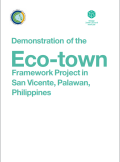
This study, Product Lifetime Extension Case Study: Refazenda presents a successful business strategy to extend products lifetime.

This studyProduct Lifetime Extension Case Study: Retalhar presents a successful business strategy to extend products lifetime.

This study, Product Lifetime Extension Case Study: SWANE-Design presents a successful business strategy to extend products lifetime.

This study, Demonstration of the Eco-town Framework Project in San Vicente, Palawan, Philippines, explores on this framework project that aims to build the foundation for establishing the Eco-towns in local communities.
This paper aims to mainstream green growth within Indonesia’s economic planning and development processes. To this end, the Green Growth Programme is developing a framework and toolkit that can be used by a variety of government agencies, especially those involved in planning and economic activities.
This report summarizes the best practice reporting recognized by the 2° Invest Awards, organized by the 2° Investing Initiative, the French Ministry for the Environment, and the French Treasury.
This case study presents the findings of an ecosystem valuation that was undertaken to assess the types and scale of economic benefits associated with wetland restoration in Ripon City Quarry, Yorkshire.
The IUCN Sri Lanka Country Office implemented a project on integrating wetland ecosystem values into river basin management in collaboration with the Mahaweli Authority of Sri Lanka. This paper focuses mainly on the direct and indirect services provided by the small tank ecosystems and possible techniques for valuing those which can be utilised in decision making regarding water and resource allocation.
In the Republic of the Maldives, coral reefs and associated habitats provide valuable ecosystem services such as fish and other food, natural hazard protection, climate regulation, and the beaches, clear blue waters, and seascapes that are the basis for the thriving tourism industry. The analysis presented in this report clearly shows that investing in coral reef management would be beneficial to the economy of North Ari Atoll.
This case study provides information on the social resilience of eight local community islands in North Ari Atoll, Maldives, and identifies differences in gender roles, resource use, and perception of environmental issues. This study is key in understanding the value of ecosystem services in one atoll in the Maldives.
